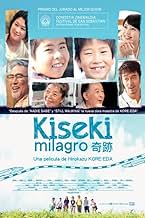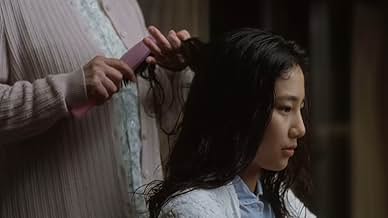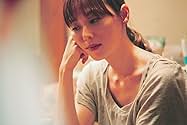VALUTAZIONE IMDb
7,3/10
8302
LA TUA VALUTAZIONE
Aggiungi una trama nella tua linguaTwelve-year-old Koichi, who has been separated from his brother Ryunosuke due to his parents' divorce, hears a rumor that the new bullet trains will precipitate a wish-granting miracle when ... Leggi tuttoTwelve-year-old Koichi, who has been separated from his brother Ryunosuke due to his parents' divorce, hears a rumor that the new bullet trains will precipitate a wish-granting miracle when they pass each other at top speed.Twelve-year-old Koichi, who has been separated from his brother Ryunosuke due to his parents' divorce, hears a rumor that the new bullet trains will precipitate a wish-granting miracle when they pass each other at top speed.
- Regia
- Sceneggiatura
- Star
- Premi
- 5 vittorie e 9 candidature totali
Kôki Maeda
- Koichi
- (as Koki Maeda)
Ôshirô Maeda
- Ryunosuke
- (as Oshiro Maeda)
Nene Ôtsuka
- Nozomi (Mother)
- (as Nene Ohtsuka)
Recensioni in evidenza
Siblings try to find a way out of the circumstances imposed on them by their parents. Their lives are turned upside down when their parents divorce and custody arrangements split them up. Twelve-year-old Koichi ends up with his mother Nozomi, and they move in with her parents in a small village where she gets a job at a supermarket. Koichi's younger brother Ryunosuke, meanwhile, moves in with his dad Kenji, a struggling musician who can't hold on to a day job. The brothers miss each other and want to bring their parents back together, and when they hear of an urban legend that if two people make the same wish at the same time while watching two bullet trains pass one another, the wish will immediately come true, they decide this is the way to reunite the family.
It has its funny moments and it reminds you of your childhood (if you are more that 25 years old haha). The concept idea is a good one and the performance its quite good too. I was expecting way more to say the true, but everyone has its own tastes. Worth watching? 1 time, yes.
It has its funny moments and it reminds you of your childhood (if you are more that 25 years old haha). The concept idea is a good one and the performance its quite good too. I was expecting way more to say the true, but everyone has its own tastes. Worth watching? 1 time, yes.
Two young brothers, Kouichi and Ryuunosuke live apart in Fukuoka and Kagosima because of there parent's divorce. One day they know about a rumour that the person who sees the two new bullet trains passing each other for the first time gains his dream, and they plans to see it to make their wish to live together with their family again. With few friends of them, they goes to their meeting point. This film is very nice. We can see two brother's strong wish and their grow up in their spirits through the trip clearly. However, if I could say one thing, I want to see more about their past, or their life with their parent after they live apart. I could see their desire to live with their family again, but I could not see much trouble or conflict. However other than this, I think this film is very good and moving film.
Kouichi (Kouki Maeda) and Ryunosuke (Oushiro Maeda) who's parents are separated and now lives apart in Fukuoka, and Kagoshima hears about a rumor that if you see the meeting of the first bullet trains from Fukuoka and Kagoshima, a miracle will happen. Wishing that the miracle will be the reunion of their parents, they set out to see the meeting of the two trains, while involving their friends, teachers, and adults around them.
Child prodigy stand up comic team Maeda-Maeda performs the role of Kouichi, and Ryunosuke. Director Hirokazu Koreeda originally had a different plot for the story, where a girl living in Fukuoka, goes to see the two trains crossing each other on the track, meets a boy from Hakata and love story ensues. But upon seeing Maeda-Maeda at the audition, he changed the story to that which involves the two brothers. The project was a promotional campaign for the opening of the Kagoshima route of Japan Railways bullet train line. They brought the project to director Koreeda, and he accepted.
Very common story that involves nothing but the life of few children, but is made extraordinary by the direction of Koreeda, and the performance of Maeda brothers. Observation of people in common life, and attention to detail is extraordinary, and can only come from the eyes of a genius. I can see why Koreeda is regarded so highly as a director. I'd say only few directors can take a theme like this, and create a truly intriguing movie like this one.
In reality it is virtually impossible to pinpoint where the two trains will meet on the track, so the story is purely fictional.
It may be difficult to see all the inner workings of this movie at a first glance, but it is worth the time to sit in and really enjoy the performance.
Child prodigy stand up comic team Maeda-Maeda performs the role of Kouichi, and Ryunosuke. Director Hirokazu Koreeda originally had a different plot for the story, where a girl living in Fukuoka, goes to see the two trains crossing each other on the track, meets a boy from Hakata and love story ensues. But upon seeing Maeda-Maeda at the audition, he changed the story to that which involves the two brothers. The project was a promotional campaign for the opening of the Kagoshima route of Japan Railways bullet train line. They brought the project to director Koreeda, and he accepted.
Very common story that involves nothing but the life of few children, but is made extraordinary by the direction of Koreeda, and the performance of Maeda brothers. Observation of people in common life, and attention to detail is extraordinary, and can only come from the eyes of a genius. I can see why Koreeda is regarded so highly as a director. I'd say only few directors can take a theme like this, and create a truly intriguing movie like this one.
In reality it is virtually impossible to pinpoint where the two trains will meet on the track, so the story is purely fictional.
It may be difficult to see all the inner workings of this movie at a first glance, but it is worth the time to sit in and really enjoy the performance.
Pre-teen brothers Ryunosuke and Koichi (played by real-life brothers Ohshirô and Koki Maeda) are forced to live apart when their separated parents end up residing in opposite ends of Kyushu. Ryunosuke broods on this, while Koichi seems more at ease with the arrangements. Together, the brothers hatch a plan to meet at the point where the new shinkansen trains pass each other, after hearing an urban legend that the vortex created by the speed of the trains has the power to grant wishes. Meanwhile, granddad tries out a new sponge cake recipe, a friend of Koichi's has acting ambitions, and Dad is writing a new song.
The usual Kore-eda themes of fractured families and kids finding magic in a flawed universe are present, but by the director's own standards this is a much lighter, almost sugar-coated engagement with those themes. There is the signature naturalistic, engrossing performances from the child actors, with Ohshirô as Ryunosuke especially impressive in his conflicted, caring attempts to be re-united with his brother. Koki is more of a one-note outing, required to be relentlessly upbeat, which he does superbly. The scene where he moves his mother to tears on the phone plays on this astutely. Forcing two young brothers to live apart for their own selfish ends could be represented in darker tones, even as abuse, but Kore-eda keeps it all light and humorous, through the simple trope of having the children be sensible and down-to-earth, and the adults, especially the bickering parents, petty and immature. The sub-plots, involving sponge cake and acting ambitions, are so removed from the main story strand that they give the film an episodic, slightly meandering feel when they pop up. Ultimately they are distracting, making the story busier than it needs to be. They also stretch the running time to over two hours. While some will delight in spending time with such engaging children, the film felt flabby to me after the 90-minute mark. The ending, while admirably avoiding sentimentality, takes too long to come around.
Such is Kore-eda's stature that a host of A-listers pack the minor roles giving them more gravitas than normal. Jô Odagiri as the musician father, Kirin Kiki as the grandmother, and Hiroshi Abe as a disciplinarian teacher ply their day-shifts admirably.
There is a lot to enjoy in I Wish, but lacking the damning social critique of Nobody Knows, and the acerbic scalpel on family life of Still Walking, this is Kore-eda choosing to crowd please rather than stretch himself.
The usual Kore-eda themes of fractured families and kids finding magic in a flawed universe are present, but by the director's own standards this is a much lighter, almost sugar-coated engagement with those themes. There is the signature naturalistic, engrossing performances from the child actors, with Ohshirô as Ryunosuke especially impressive in his conflicted, caring attempts to be re-united with his brother. Koki is more of a one-note outing, required to be relentlessly upbeat, which he does superbly. The scene where he moves his mother to tears on the phone plays on this astutely. Forcing two young brothers to live apart for their own selfish ends could be represented in darker tones, even as abuse, but Kore-eda keeps it all light and humorous, through the simple trope of having the children be sensible and down-to-earth, and the adults, especially the bickering parents, petty and immature. The sub-plots, involving sponge cake and acting ambitions, are so removed from the main story strand that they give the film an episodic, slightly meandering feel when they pop up. Ultimately they are distracting, making the story busier than it needs to be. They also stretch the running time to over two hours. While some will delight in spending time with such engaging children, the film felt flabby to me after the 90-minute mark. The ending, while admirably avoiding sentimentality, takes too long to come around.
Such is Kore-eda's stature that a host of A-listers pack the minor roles giving them more gravitas than normal. Jô Odagiri as the musician father, Kirin Kiki as the grandmother, and Hiroshi Abe as a disciplinarian teacher ply their day-shifts admirably.
There is a lot to enjoy in I Wish, but lacking the damning social critique of Nobody Knows, and the acerbic scalpel on family life of Still Walking, this is Kore-eda choosing to crowd please rather than stretch himself.
I've been impressed with Koreeda's work in the past. "Maborosi" and "After Life" are two excellent, deeply philosophical and moving films. Maybe based on those I had unrealistically high expectations (further inflated by the DVD box boasting a dozen rave reviews & awards), but "I Wish" failed to deliver.
One hour into this 2-hour movie I had to shut it off. Since I didn't watch the whole thing I can't fairly rate it, but I wanted to share my (unpleasant) experience because I wish someone had warned me the same way. This was the first time in my life I've ever shut off a movie from sheer boredom. No, boredom isn't the word. It was more a feeling of total disconnection. The scenes, perhaps attempting to recreate the disconnected, ADD-type thought process of little kids, were so unrelated and random that I became irritated.
Like my title suggests, if you want to see a truly magical film about youth, innocence and the not-so-innocent, hunt down a film called "Kikujiro" (1999). More about that later. First let's talk about "I Wish".
Here is a breakdown of the first hour. Each scene lasts 2-5 minutes. At any time if you become bored, skip to the last paragraph of my review.
Scene 1) a boy grabs a washcloth and cleans his desk. Scene 2) The boy's mother is talking about meaningless things while the grandmother makes random gestures in the air, saying "I'm the wind. I'm a ghost. Etc..." Scene 3) The boys walk to school and complain about the hill. Scene 4) Kids are scolded by a teacher for not doing their homework properly. Scene 5) Kids are in the hall complaining about the teacher. Scene 6) Back to the mother and grandparents talking about vegetable gardens. Scene 7) Jump to some other kids at a swimming pool. Scene 8) The boy stares blankly at his homework assignment. Scene 9) A bunch of old men talk about baking a cake for the festival. Scene 10) The boys are back in school ogling the librarian's legs. Scene 11) The boy's father wakes up, strums a guitar and goes back to sleep. Scene 12) The kids gather and talk about acting.
While I hesitate to call the movie "bad" because I didn't watch it all the way through, I can definitely conclude that the first hour didn't provide enough substance to convince me to keep watching. And trust me, I like slow movies (2001, Werckmeister Harmonies, Hitchcock's Rope). Instead of watching "I Wish", I HIGHLY recommend a Japanese film called "Kikujiro" which this movie seemed to be imitating. However, even though it is slow paced, "Kikujiro" wastes no scenes. They all relate to each other, build upon each other and eventually lead you to a powerful message by the time the film ends. The music in "Kikujiro" (composed by the Japanese master Joe Hisaishi) is also leagues above the mediocre soundtrack of "I Wish", another turnoff. Maybe one day I'll go back & finish the last hour of this film and revise this review if I feel differently. But all the same, I'd rather spend my time watching something else.
One hour into this 2-hour movie I had to shut it off. Since I didn't watch the whole thing I can't fairly rate it, but I wanted to share my (unpleasant) experience because I wish someone had warned me the same way. This was the first time in my life I've ever shut off a movie from sheer boredom. No, boredom isn't the word. It was more a feeling of total disconnection. The scenes, perhaps attempting to recreate the disconnected, ADD-type thought process of little kids, were so unrelated and random that I became irritated.
Like my title suggests, if you want to see a truly magical film about youth, innocence and the not-so-innocent, hunt down a film called "Kikujiro" (1999). More about that later. First let's talk about "I Wish".
Here is a breakdown of the first hour. Each scene lasts 2-5 minutes. At any time if you become bored, skip to the last paragraph of my review.
Scene 1) a boy grabs a washcloth and cleans his desk. Scene 2) The boy's mother is talking about meaningless things while the grandmother makes random gestures in the air, saying "I'm the wind. I'm a ghost. Etc..." Scene 3) The boys walk to school and complain about the hill. Scene 4) Kids are scolded by a teacher for not doing their homework properly. Scene 5) Kids are in the hall complaining about the teacher. Scene 6) Back to the mother and grandparents talking about vegetable gardens. Scene 7) Jump to some other kids at a swimming pool. Scene 8) The boy stares blankly at his homework assignment. Scene 9) A bunch of old men talk about baking a cake for the festival. Scene 10) The boys are back in school ogling the librarian's legs. Scene 11) The boy's father wakes up, strums a guitar and goes back to sleep. Scene 12) The kids gather and talk about acting.
While I hesitate to call the movie "bad" because I didn't watch it all the way through, I can definitely conclude that the first hour didn't provide enough substance to convince me to keep watching. And trust me, I like slow movies (2001, Werckmeister Harmonies, Hitchcock's Rope). Instead of watching "I Wish", I HIGHLY recommend a Japanese film called "Kikujiro" which this movie seemed to be imitating. However, even though it is slow paced, "Kikujiro" wastes no scenes. They all relate to each other, build upon each other and eventually lead you to a powerful message by the time the film ends. The music in "Kikujiro" (composed by the Japanese master Joe Hisaishi) is also leagues above the mediocre soundtrack of "I Wish", another turnoff. Maybe one day I'll go back & finish the last hour of this film and revise this review if I feel differently. But all the same, I'd rather spend my time watching something else.
Lo sapevi?
- QuizShinkansen wanted to make a movie to promote their bullettrains. They approached Koreeda, an avid trainlover. He came up with this movie.
- ConnessioniFeatured in A Story of Children and Film (2013)
- Colonne sonoreKAGOSHIMA OHARA BUSHI
Written by Quruli
Performed by Quruli
I più visti
Accedi per valutare e creare un elenco di titoli salvati per ottenere consigli personalizzati
- How long is I Wish?Powered by Alexa
Dettagli
- Data di uscita
- Paese di origine
- Siti ufficiali
- Lingua
- Celebre anche come
- Phép Màu Giữa Đời Thường
- Luoghi delle riprese
- Aziende produttrici
- Vedi altri crediti dell’azienda su IMDbPro
Botteghino
- Lordo Stati Uniti e Canada
- 145.808 USD
- Fine settimana di apertura Stati Uniti e Canada
- 10.919 USD
- 13 mag 2012
- Lordo in tutto il mondo
- 2.371.548 USD
- Tempo di esecuzione2 ore 8 minuti
- Colore
- Mix di suoni
- Proporzioni
- 1.85 : 1
Contribuisci a questa pagina
Suggerisci una modifica o aggiungi i contenuti mancanti
































